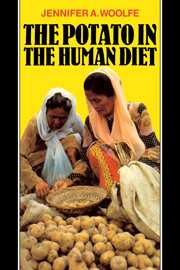Book contents
- Frontmatter
- Contents
- Dedication
- Preface
- Acknowledgements
- Abbreviations and terms
- Introduction
- 1 Structure of the potato tuber and composition of tuber dry matter
- 2 The nutritional value of the components of the tuber
- 3 Protein and other nitrogenous constituents of the tuber
- 4 Effects of storage, cooking and processing on the nutritive value of potatoes
- 5 Glycoalkaloids, proteinase inhibitors and lectins
- 6 Patterns of potato consumption in the tropics
- Index
- Frontmatter
- Contents
- Dedication
- Preface
- Acknowledgements
- Abbreviations and terms
- Introduction
- 1 Structure of the potato tuber and composition of tuber dry matter
- 2 The nutritional value of the components of the tuber
- 3 Protein and other nitrogenous constituents of the tuber
- 4 Effects of storage, cooking and processing on the nutritive value of potatoes
- 5 Glycoalkaloids, proteinase inhibitors and lectins
- 6 Patterns of potato consumption in the tropics
- Index
Summary
The potato (Solarium spp.; Figure 1) is grown in 79% of the world's countries (FAO, 1986). It is second only to maize in terms of the number of producer countries and fourth after wheat, maize and rice in global tonnage. Its importance in European countries, the USSR, North America, Australia and the Andean countries of Latin America is well known. Less widely recognized, however, is the rapid growth rate of potato production in developing countries.
FAO statistics show that the percentage increase in potato production from 1961/65 to 1979, for all developing market economy countries, was greater than 99%, while that of cereals and other roots and tubers was, respectively, only 47% and 44% (International Potato Center, 1981). Potatoes are one of the most efficient crops for converting natural resources, labour and capital into a high quality food (Horton, 1981). They can yield more nutritious food material more quickly on less land and in harsher climates than most other major crops; and the edible food material can be harvested after only 60 days.
Current and future roles
Though potatoes occupy a smaller area in most developing countries than do other major food crops, their increasing popularity has caused planners and policy makers to take a closer look at the current and future roles that potatoes may play in national food production systems.
In recent years, the enormous potential for agronomic improvement in food plants through plant breeding has been increasingly recognized. In the case of potatoes, greater attention is being focused on ways to increase production, improve storage methods and facilitate marketing.
- Type
- Chapter
- Information
- The Potato in the Human Diet , pp. 1 - 6Publisher: Cambridge University PressPrint publication year: 1987
- 1
- Cited by



